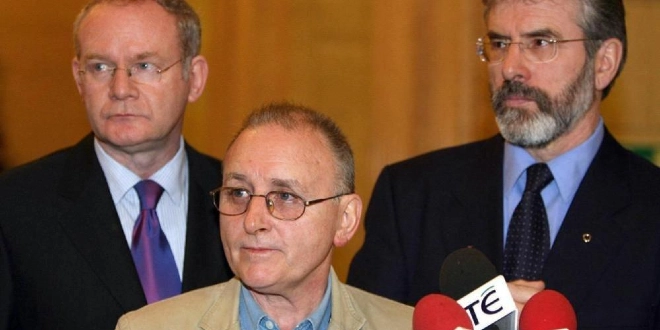On the second day of legal proceedings in his defamation case against the BBC, former Sinn Féin president Gerry Adams gave emotional testimony at the High Court in Dublin. The case centers on a 2016 episode of the BBC’s Spotlight programme, which Mr. Adams claims falsely accused him of authorizing the murder of Denis Donaldson, a former senior member of Sinn Féin and a confirmed informant for British intelligence services.
Donaldson was killed in 2006, several months after publicly admitting he had worked for the police and MI5 for two decades. Mr. Adams has consistently denied any involvement in his death and is now seeking to clear his name through the courts.
Adams Reflects on His Political Roots and Internment
During his testimony, Mr. Adams responded to questions from his legal representative, senior counsel Declan Doyle. He described the origins of his political activism, explaining that his engagement with the republican movement began in the early 1970s amid the civil unrest in Northern Ireland and the presence of British troops on the streets.
Asked by Mr. Justice Alexander Owens to provide a brief summary of his path into political life, Mr. Adams recounted how he became involved in assisting displaced families in Belfast. He said that supporting those who had fled their homes marked the beginning of his community-focused activism and that this early work influenced his broader political philosophy.
Mr. Adams recalled his experience of being arrested and subsequently interned without trial at Long Kesh prison, where he said he was rendered unconscious during his arrest. He became visibly emotional as he discussed the hunger strikes of 1981, a period during which ten Republican prisoners died in the H-Blocks. He noted that, alongside the hunger strikers, that summer also saw deaths among prison staff, members of the security forces, and IRA members, and he emphasized that the loss of life during that time was avoidable.
He explained that, during his leadership of Sinn Féin, he aimed to develop the party into a political force that could offer a peaceful alternative to armed conflict. His testimony also covered his role in the peace negotiations that led to the Good Friday Agreement, describing it as a pivotal effort to advance non-violent political progress.
Denial of Allegations and Timeline of Donaldson’s Exposure
Mr. Adams acknowledged that he had known Denis Donaldson personally and that he had also known Donaldson’s family. However, he clarified that Donaldson worked in a different area of the party and did not report directly to him. He described Donaldson as an administrative staff member based at Sinn Féin’s Stormont offices.
He outlined the timeline leading up to Donaldson’s exposure, stating that he was arrested in 2002 in connection with an alleged spying operation within the Assembly. Charges against him were later dropped in late 2005. It was around this time that Donaldson was informed by authorities that his identity as a long-time intelligence agent was about to be publicly revealed.
According to Mr. Adams, after learning this information, he instructed a senior party official to verify the facts. Donaldson subsequently confessed that he had been an informant for two decades. Following this revelation, he was expelled from Sinn Féin.
Donaldson was later found shot dead in a remote cottage near Glenties, County Donegal, in April 2006. Mr. Adams told the court that he was surprised Donaldson had remained in such a location after his cover had been blown. He said he had been further shocked after a national newspaper published photographs identifying Donaldson’s whereabouts shortly before the killing.
Jury Views Documentary at Heart of Legal Dispute
As part of the court proceedings, the jury was shown the Spotlight documentary which lies at the center of the defamation claim. Mr. Adams maintains that the programme and its accompanying online publication wrongfully suggested he gave approval for Donaldson’s murder.
In his evidence, Mr. Adams explained that he first became aware of the documentary’s allegations when he received a letter in June 2016 from a BBC journalist. The letter, written by Jennifer O’Leary, outlined several claims regarding his alleged role in the events surrounding Donaldson’s death.
This initial letter, along with a follow-up communication and a brief legal reply from Mr. Adams’ solicitors—categorically rejecting the allegations and asserting that he had no involvement in the killing—were submitted to the court as part of the case’s first exhibit.
At this stage, Mr. Doyle requested that the jury view the documentary. The courtroom was equipped with two monitors through which all twelve jurors—seven men and five women—watched the content in full.
The case continues, with further testimony and legal arguments expected in the coming days.
 The Daily Star Ireland
The Daily Star Ireland

